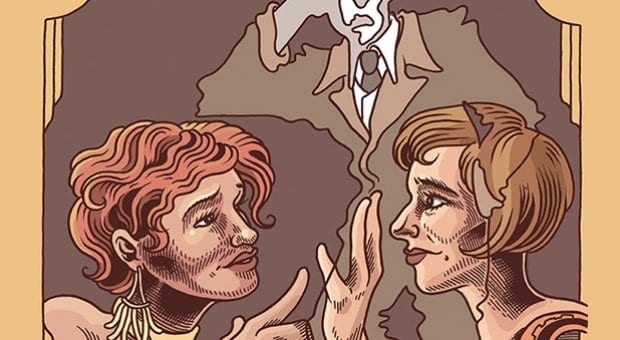A sad friend bemoans various relationship woes. Nothing is going right, so I somewhat callously advise that they break up. “But we’re in love,” my friend claims, as if that makes the pain all right. “Love” is a word thrown around as an all-powerful, cure-all social cement. Platitudes abound: love heals all wounds, love will save the day, love conquers all. As a younger queer person I found myself, closeted and repressed, in the throes of my first unreciprocated boy-crush on a guy my friends were all convinced was straight. I found solace in that great fount of knowledge, the melodramatic anthem “Love Hurts.”
This age-old aphorism represents eons of broken hearts, jealous lovers, miserable families or violent obsessions distilled into countless disconsolate songs, stories and plays. Queer people have often felt the pain of love more poignantly, trapped in places where expressing our love could lead to ostracism or violence. That’s why when Mabel Hampton, the subject of my last column, went to see The Captive at New York City’s Empire Theater in 1927, she was enthralled by the play.
The Captive is a translation of French infantryman turned playwright Édouard Bourdet’s La prisonnière. The domestic drama follows Irene de Montcel, a smart, beautiful, independent Parisian woman. Irene and her younger sister are daughters of a tyrannical ambassador who is taking a position in Rome, though Irene is set on staying in Paris and won’t say why. Their father demands she accompany him, threatening to cut her off from family and finances. Irene convinces him that her childhood friend Jacques intends to marry her and persuades Jacques to go along with the scheme.
Jacques breaks off his romance with Françoise, a beautiful socialite, just before being visited by a Monsieur D’Aiguines. During this conversation, one of the most affecting in the play, the truth is revealed. Irene has been spending all her time with Madame D’Aiguines (who never actually makes an appearance). They are in love. “They are shadows,” D’Aiguines warns. “They must be left alone to dwell in the kingdom of shadows!” Jacques confronts Irene about her relationship, and she promises that she can escape it with his help, that they will marry.
A year on, Irene and Jacques live a functional but ultimately loveless marriage. Jacques finds himself seeking out the company of Françoise, and the sudden appearance of Madame D’Aiguines shakes Irene’s passive existence. “For a year I’ve been living with a statue, and that woman had only to reappear for the statue to come to life, to become a human being capable of suffering and trembling!” Jacques says. I don’t want to ruin the ending, but a bouquet of violets arrives for Irene, a door slams, the curtain falls.
Hampton went back to see The Captive multiple times, noticing gay men and women attending the show together. She brought friends, one of whom introduced her to the woman cast as Irene, Helen Menken. “Boy, I felt so proud!” Hampton recalled. “And she says, ‘Why do you like the show?’ I said, ‘Because it seems a part of my life and what I am and what I hope to be.’ She says, ‘That’s nice. Stick to it! You’ll be all right.’”
Fortunately, Hampton saw The Captive before the police raided the show and two other productions in February 1927. According to an account by The Captive’s leading man, Basil Rathbone, a plainclothes police officer stopped the actors before their entrance and said, “Please don’t let it disturb your performance tonight, but consider yourself under arrest!” After the curtain, 41 actors, directors and producers ended up actual captives and the play’s successful run was ended prematurely.
These days, police wouldn’t give a play like The Captive a second glance. I am free from adolescent heartache and am able to write publicly about my old crush, whom I eventually got over, though I felt a smug victory when I ran into him and his boyfriend at Pride a few years ago. While pangs of love sometimes anguish my shrivelled, jaded heart, at least I can listen to cheesy oldies and find more sympathetic shoulders than my own to cry on. Love hurts.
History Boys appears in every issue of Xtra.


 Why you can trust Xtra
Why you can trust Xtra


